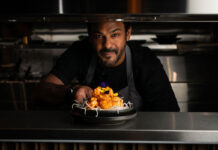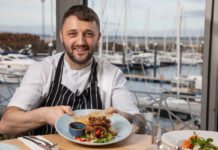

Quality, value for money and support are key priorities for operators in wine purchase decisions
SOURCING wine for a bar, restaurant or hotel is a tricky balancing act.
Although price has major bearing on whom licensees deal with and the wines they order, there are other factors to consider, from a merchant’s ability to source interesting products to whether staff training is provided.
That’s why many operators say it’s vital to shop around.
Stravaigin in Glasgow buys wine from a number of suppliers, including Liberty, Forth, Vintage Roots, Wine Importers, Alliance and Alexander Wines.
Sommelier Steven Auld said a merchant’s ability to offer genuine value for money is a key requirement.
“That can mean being a bit clever and looking at new things to help try and keep costs down but never compromising on quality,” he said.
“For example, we really wanted a Pinot Noir, which can be a very expensive variety to sell by the glass, but one merchant came up with one from Romania – great wine, point of difference and excellent value; exactly what a good merchant is all about.
“I think it is our obligation to our consumers to always shop around in the hope of finding something unique.
“You have to find the quality first and talk price later.”
Brian Maule, chef patron at Chardon d’Or is in Glasgow’s West Regent Street, agreed that shopping around is “essential”.
I think we owe it to our customers to shop around to find unique and interesting wines.
He deals with a number of merchants, including Alliance, Les Caves de Pyrene, l’Art du Vin, WoodWinters, Alexander Wines, Corney & Barrow, Inverarity Morton, Boutinot, Hallgarten Druitt and Liberty.
“It isn’t just about getting wines at the right price point, it is about getting interesting wines with integrity at every price point,” Brian explained.
“And, taking it a step further, the goal should be a wine that has that something extra, whether it be history, pedigree, fashion – I would like every wine to be exciting in some way and I don’t think you can achieve that with a single supplier.”
Working with suppliers able to offer a broad range is also a priority for Darren Scott, owner of Boudoir in Glasgow’s Merchant City.
“Due to the fact we stock 100 different wines and specialise in [those from] France and Italy, I find it best to use a few suppliers,” he said.
“This enables me to bring in unique and quality wines which represent Boudoir whilst shopping around for the best prices.
“An understanding of each other’s business is important to work together for the best quality at the best price.”
On the Isle of Skye, Tom Eveling, a director at Kinloch Lodge hotel and restaurant, uses more than 20 wine suppliers, including Friarwood, Liberty, Corney & Barrow, Whirly Wines, l’Art du Vin, Enotria, Forth, Alliance and Raeburn Fine Wines.
He said casting the net far and wide is key to creating an “interesting list which offers value for money”.
“I look for a good selection of wines which I cannot obtain anywhere else,” Eveling told SLTN.
While price and range heavily influence whom operators buy wine from, the level of support and staff training offered by merchants is another key consideration.
Virginie Brouard, who owns Edinburgh wine bar Le Di-Vin with husband Ghislain Aubertel, said she makes the most of the staff training offered by her suppliers, which include Wine Importers, and attends tasting events.
“We get support from our wine suppliers with staff training every time we change the wine list, around twice a year,” she said.
“They’ll come in with bottles and tasting notes and spend time with the staff explaining and answering questions.
“We also regularly attend wine tastings, which are very informative and interesting and important for the business to be well known.
“We also get our staff involved in wine tastings; some of them have completed wine courses at different levels.”
Stravaigin’s Steven Auld echoed the importance of staff training.
“Although we have a thorough in-house staff training programme, we appreciate the unique point of view from our suppliers and find the staff are more inclined to remember the characteristics of a new wine if the supplier has been involved in the tasting and staff briefing,” he said.
“Although we have a very knowledgeable team buying the wine here at Stravaigin, our merchants are excellent at helping us to be ‘on trend’.
“Most of the merchants we use are national companies so they are able to keep us up to date with what is happening in the rest of the country so we can try and keep ahead of the competition.
Price is obviously important but there are other factors to consider.
“The merchants who are available when we require it and do not pester are the merchants we will automatically turn to when we need assistance.
“One of our key suppliers has just helped with a wine preservation system to help promote wine by the glass sales.”
Brian Maule agreed there are a range of factors for operators to consider when deciding who to deal with.
“The most important thing is the best possible price but also taken into account is staff training, logistics (how often and reliable deliveries are), emergency deliveries, good communication about changes, such as vintage change and advance warning of out of stock wines,” he added.
“I think we actually choose suppliers for an individual strength; the wines they sell will always be the most important factor, but I think it is often secondary factors, such as those mentioned, that will determine how much we buy from them.”


Images: Top-Edinburgh wine bar Le Di-Vin opened beside La P’tite Folie restaurant four years ago. Above-Chef Maule said price is only one of a number of factors to consider when choosing a wine supplier.

























